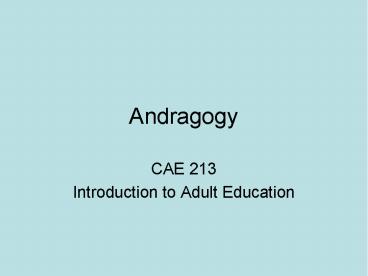Andragogy - PowerPoint PPT Presentation
Title:
Andragogy
Description:
Andragogy CAE 213 Introduction to Adult Education Discussion 1 From your experience think of a situation that clearly illustrates pedagogy and one that illustrates ... – PowerPoint PPT presentation
Number of Views:3047
Avg rating:3.0/5.0
Title: Andragogy
1
Andragogy
- CAE 213
- Introduction to Adult Education
2
Discussion 1
- From your experiencethink of a situation
- that clearly illustrates pedagogy
- and one that illustrates andragogy
3
Andragogy
- Two streams of inquiry
- Scientific stream rigorous and experimental
investigation Edward L. Thorndike 1928
Adult Learning - Intuitive stream analysis of experience
Eduard C. Lindeman 1926 The Meaning of
Adult Education
4
Andragogy
- Lindemans insights
- Curriculum is built around student need
- Learner experiences is a highly valued resource.
- Adult education is a cooperative venture in
non-authoritarian, informal learning.
5
Andragogy
- Lindemans Assumptions about Adult Learning
- Adults are motivated to learn as they experience
needs and interests that learning will satisfy. - Adult orientation to learning is life centered.
- Experience is the richest resource of adult
learning. - Adults have a deep need to be self-directing. The
role of the teacher is to engage in the process
of mental inquiry. - Individual differences among people increase with
age.
6
Discussion 2
- What are you thoughts after reflecting on
Lindemans five key assumptions about adult
learners - Adults - motivated to learn as they experience
needs. - Adult orientation - is life centered.
- Experience - the richest resource of adult
learning. - Adults - deep need to be self-directing.
- Individual differences - increase with age.
7
Andragogy
- The Journal of Adult Education and other
publications of the American Association for
Adult Education produced growing insights from
practitioners concerning adult education. - The concepts of lifelong learning, democratic
participatory education, and critical thought all
became key values in the practice of adult
education.
8
Discussion 3
- Based on your reading in this course and others,
how has clinical psychology contributed to
andragogy (education)? - Freud
- Erickson
9
Andragogy
- Key psychological concepts guided adult educators
in understanding learners - Freud learners are complex and may not be aware
that their subconscious influences their
interests and behavior - Jung learning is holistic involving all parts
of the conscious mind including sensation,
thought, emotion, intuition
10
Andragogy
- Erickson developmental framework identified key
issues such as trust/distrust, autonomy/shame,
initiative/guilt, industry/inferiority,
identity/role confusion, intimacy/isolation,
generativity/stagnation, integrity/dispair.
11
Andragogy
- Carl Rogers conceptualized a student-centered
approach to education - We cannot teach directly, we facilitate learning
- Significant learning is related to self
development - Experience which reorganizes self is resisted
- Perceived threat to self increases resistance
- Effective education reduces perceived threat to
self to a minimum
12
Andragogy
- Rogers and Maslow emphasized
- the importance of safety in learning
- that learning was a process not a product
13
Andragogy
- In the 1950s, practitioners felt a central goal
was needed to unify the discipline - The Ford Foundation funded meetings to identify a
central unifying goal - Practitioners were divided between two goals the
improvement of individuals and the improvement of
society.
14
Finding a common core
- work force training
- agricultural
high school - extension A
equivalency - ESL
YMCA - business night school
15
Andragogy
- Adult Education did not unify around a central
goal in the 1950s - Divergent themes from key practitioners continue
to influence Adult Education - A unifying goal has not emerged
- A unifying central theory of adult learning has
emerged even if there is not full agreement in
calling it Andragogy
16
Andragogy
- Key concepts in adult learning (p. 4)
- The need to know
- The learners self-concept
- The role of experience
- Readiness to learn
- Orientation to learning
- Motivation
17
Discussion 4
- How has adult education contributed to
andragogy? - How does the andragogical model fit with your own
learning style?































